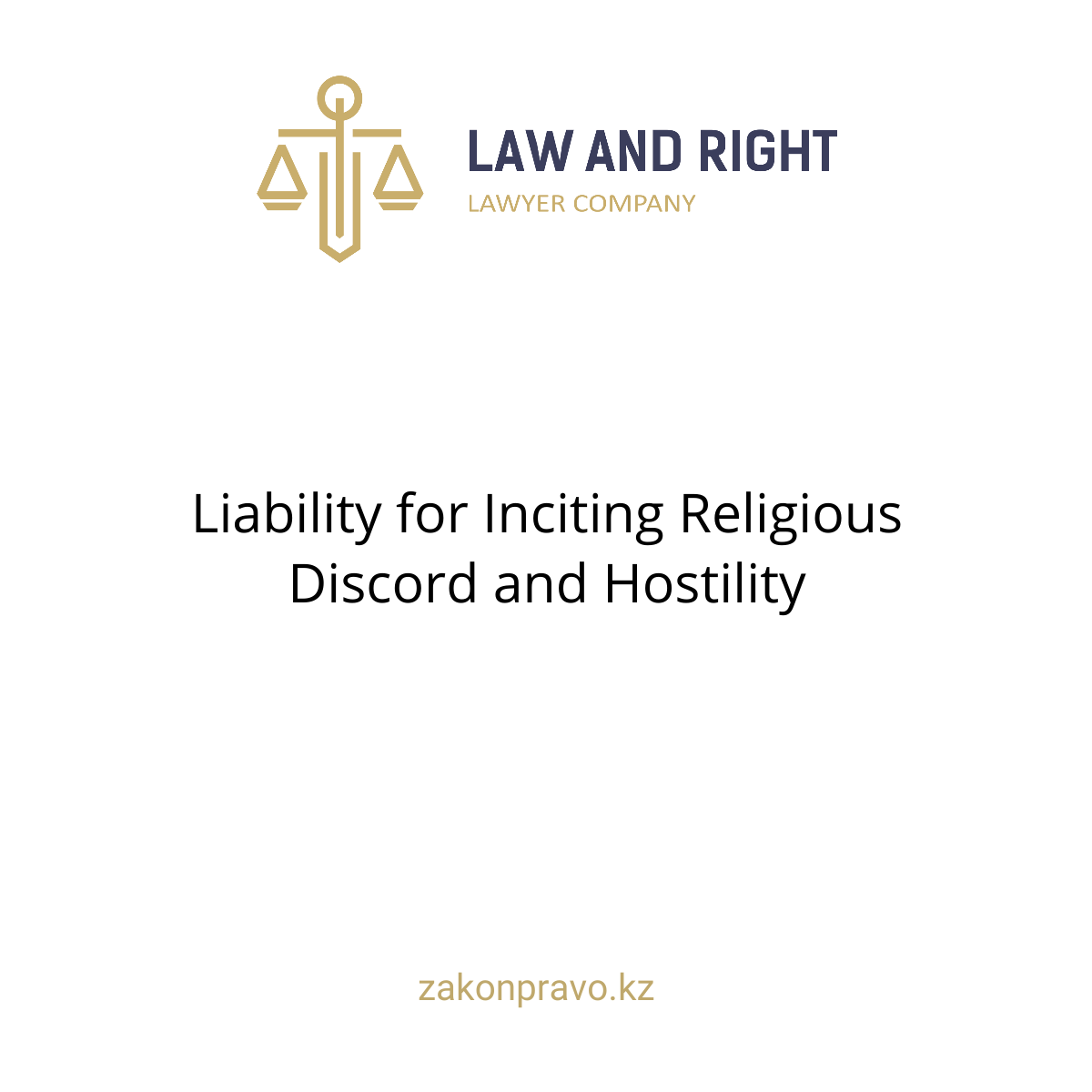Liability for Inciting Religious Discord and Hostility
In the Republic of Kazakhstan, liability for actions related to inciting religious discord is regulated by both administrative and criminal legislation. The transition from administrative to criminal liability depends on the nature, method, and consequences of the committed acts.
Religious discord arises when an individual or group commits actions aimed at inciting hatred, hostility, or degrading the dignity of others based on their religious affiliation.
This may manifest in the following forms:
Public insults against believers or religion (mockery, humiliation of religious symbols or sacred texts);
Calls for violence or discrimination based on religion;
Dissemination of ideas about the superiority of one religion over others, degrading other faiths;
Conducting aggressive propaganda against religious groups;
Provoking conflicts between representatives of different faiths.
📌 Important: Discord does not begin with differing opinions but with aggressive, derogatory, or dangerous behavior towards others based on religion.
⚖️ Administrative Liability (Article 453 of the Code of Administrative Offenses of the RK)
Article 453 of the Code of Administrative Offenses (CoAO) provides for liability for the production, storage, import, transportation, and distribution of materials aimed at inciting religious discord. If such actions do not constitute a criminal offense, they result in administrative fines and confiscation of the materials.
Examples from Judicial Practice:
In 2015, citizen A. was fined 100 MCI for possessing religious literature containing calls to incite religious discord, which he had purchased in Turkey for personal use. (Astana City Court)
In 2023, a resident of Almaty region was held administratively liable for distributing destructive religious materials via messengers. (NUR.KZ)
⚖️ Criminal Liability (Article 174 of the Criminal Code of the RK)
Article 174 of the Criminal Code establishes criminal liability for intentional actions aimed at inciting religious discord, offending the religious feelings of citizens, and promoting exclusivity or superiority based on religious affiliation. Punishment ranges from fines to imprisonment for up to 20 years, depending on the severity of the offense.
Examples from Judicial Practice:
In 2019, a resident of Baikonur was found guilty of distributing audio files containing sermons aimed at inciting religious discord via the social network "VKontakte" and was sentenced to 3 years of restricted freedom. (Court of the RK)
In 2024, defendant I. sent electronic books containing materials inciting religious discord to 13 recipients and was sentenced to 4 years of imprisonment. (Court of the RK)
🔍 Criteria for Differentiating Administrative and Criminal Liability
The transition from administrative to criminal liability depends on the following factors:
Nature of Actions: If actions are intentional and aimed at inciting hostility or offending the feelings of believers, this qualifies as a criminal offense.
Means of Distribution: Public dissemination through media, the internet, or messengers increases liability.
Repetition and Organization: Repeated actions, actions committed by a group, or using official authority are considered aggravating factors.
Consequences: If actions lead to serious consequences such as mass riots or violence, liability becomes more severe.
🧭 Practical Recommendations
Material Assessment: Before distributing religious materials, ensure they do not contain calls for hostility or offensive content.
Consult Experts: If in doubt, seek advice from lawyers or religious relations specialists.
Be Cautious in Statements: Avoid posting comments or materials that could be interpreted as inciting hostility.
Know the Law: Familiarize yourself with Articles 174 of the Criminal Code and 453 of the Administrative Code to understand the limits of permissible behavior.
Example Scenario:Sharing an audio recording with elements of religious discord in a closed WhatsApp group may lead to either administrative or criminal liability depending on the specific circumstances.
🔍 Key Qualification Criteria:
| Criteria | Administrative Liability (Art. 453 CoAO) | Criminal Liability (Art. 174 CC) |
|---|---|---|
| Form of Guilt | Typically without intent | Only intentional |
| Distribution Method | Closed group, limited audience, no agitation | Even in a closed group, if there’s agitation |
| Content Character | Ambiguous, no direct incitement | Direct incitement, insults, hostility |
| Purpose of Distribution | No intent to offend or incite | Clear intent to incite hostility |
| Number of Recipients | 2–3 people — likely administrative | 10+ people — considered "massive" |
| Repetition/Organization | One-time action | Systematic or pre-planned |
🧾 Position of Judicial Practice of the RK:
If the material is shared with a small group (e.g., 2–5 people) without comments or agitation, this is likely to fall under administrative liability (Article 453 CoAO).
If the material contains direct calls for hostility, hostile comparisons of religions, or insults against believers, even in a closed group, a criminal case may be initiated under Article 174 of the Criminal Code.
Position of the Supreme Court of the RK:Closed channels (e.g., WhatsApp groups) do not preclude publicity if:
There are many participants (more than 10 people);
Information is shared systematically;
The distributor has influence in the group (e.g., admin, leader);
Recipients further share the information (chain reaction).
🧷 Conclusion:
🔹 If the audio recording does not contain direct calls for violence, the group is small and clearly private — administrative liability may apply.
🔹 If the recording contains aggressive, offensive, or inciting rhetoric and distribution was intentional, a criminal case may be initiated.
Attention!
Law and Law Law Law draws your attention to the fact that this document is basic and does not always meet the requirements of a particular situation. Our lawyers are ready to assist you in legal advice, drawing up any legal document suitable for your situation.
For more information, please contact a Lawyer / Attorney by phone: +7 (708) 971-78-58; +7 (700) 978 5755, +7 (700) 978 5085.
Attorney at Law Almaty Lawyer Legal Services Legal Advice Civil Criminal Administrative Cases Disputes Protection Arbitration Law Firm Kazakhstan Law Office Court Cases


